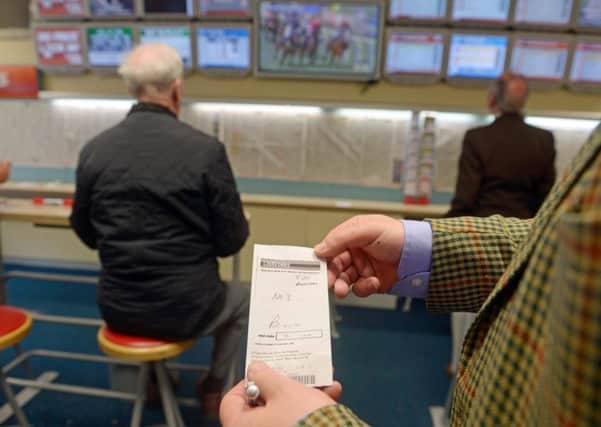Donald Morrison: The stakes couldn't be higher for our betting shops over gaming machines


The language used has been telling. Money spent in betting shops is said by commentators and politicians to have been “lost,” “blown,” “wasted” or “frittered away” in an “epidemic” of gambling. It’s difficult to imagine this type of language being used to describe money spent on other forms of entertainment – the local pub, cinema or takeaway, After all, there is no discernible difference. They all provide enjoyment in one form or another.
A trip to the bookies is part of the leisure experience enjoyed by more than 6 million people, including around 650,000 in Scotland.
Advertisement
Hide AdAdvertisement
Hide AdAs adults, they have the right to spend their leisure time and money how they choose without being unfairly labelled as vulnerable addicts. Too often, spending on betting is equated with problem gambling which is utterly disingenuous. The vast majority of customers gamble within their means and gamble for fun.


Levels of problem gambling in Scotland and the UK are low by international standards and have remained statistically stable, according to the industry regulator. That isn’t good enough, of course, and bookmakers will continue to lead the way in promoting responsible gambling, with new safeguards in shops and more education and counselling support in local communities. But let’s have some perspective. There is no gambling epidemic.
Another common falsehood is that spending in betting shops represents a drain on the economy.
That could be said of some forms of gambling, but not bookmakers. Money spent in Scotland’s 980 betting shops is recirculated back into the local and national economy through taxes, business rates, rent, staff salaries and funding support for racing.
All told, betting shops inject around £235 million into the Scottish economy, money which helps fund frontline public services, directly supports 5,000 employees and their families, stimulates the retail economy, and helps fund a successful Scottish horse racing industry. Your pound goes a long way at the bookies.


Sadly, there is a real danger that this contribution will be lost to the economy if the UK Government imposes a significant cut in stakes on gaming machines in betting shops. Opponents are hoping for a drastic cut to £2.
Such a move would decimate the retail sector, forcing 4,500 shops to close with the loss of 21,000 jobs, including 2,500 in Scotland. The UK Treasury would lose more than £1 billion in tax receipts. Local authority funding through business rates would decline and British racing warns it is at risk of losing £50 million per annum in funding.
A curb on bookies comes with a severe price tag for the rest of the economy but with absolutely no guarantee that the very people the Government is seeking to help will benefit in any way. Indeed, there is a real danger that those at risk will be exposed to further harm if they are displaced to other gambling venues that lack our industry-leading safeguards.
Advertisement
Hide AdAdvertisement
Hide AdIn those circumstances, it is difficult to see how anyone gains from a £2 stake, except – of course – our commercial rivals. Some critics have predicted a stake reduction would see a return to traditional forms of gambling, such as football and racing.
The evidence is clear, though. Customers won’t abandon digital gaming and revert back to ‘over the counter’ betting. They will simply go elsewhere. Betting on those sports remains popular but not in large enough numbers to sustain the industry or the thousands of jobs it supports.
The prospect of 2,500 job losses in Scotland should alarm every single politician in the country. It is a heavy price to pay for a policy that would will cost the public finances dearly, hurt the retail economy and have a negative impact on British racing finances, while doing nothing to address problem gambling, and potentially even driving it out of sight. Even at this late stage, we would urge the UK Government to consider the calamitous social and economic consequences of a £2 limit. There really is too much at stake.
Donald Morrison, public affairs and media relations, Association of British Bookmakers.